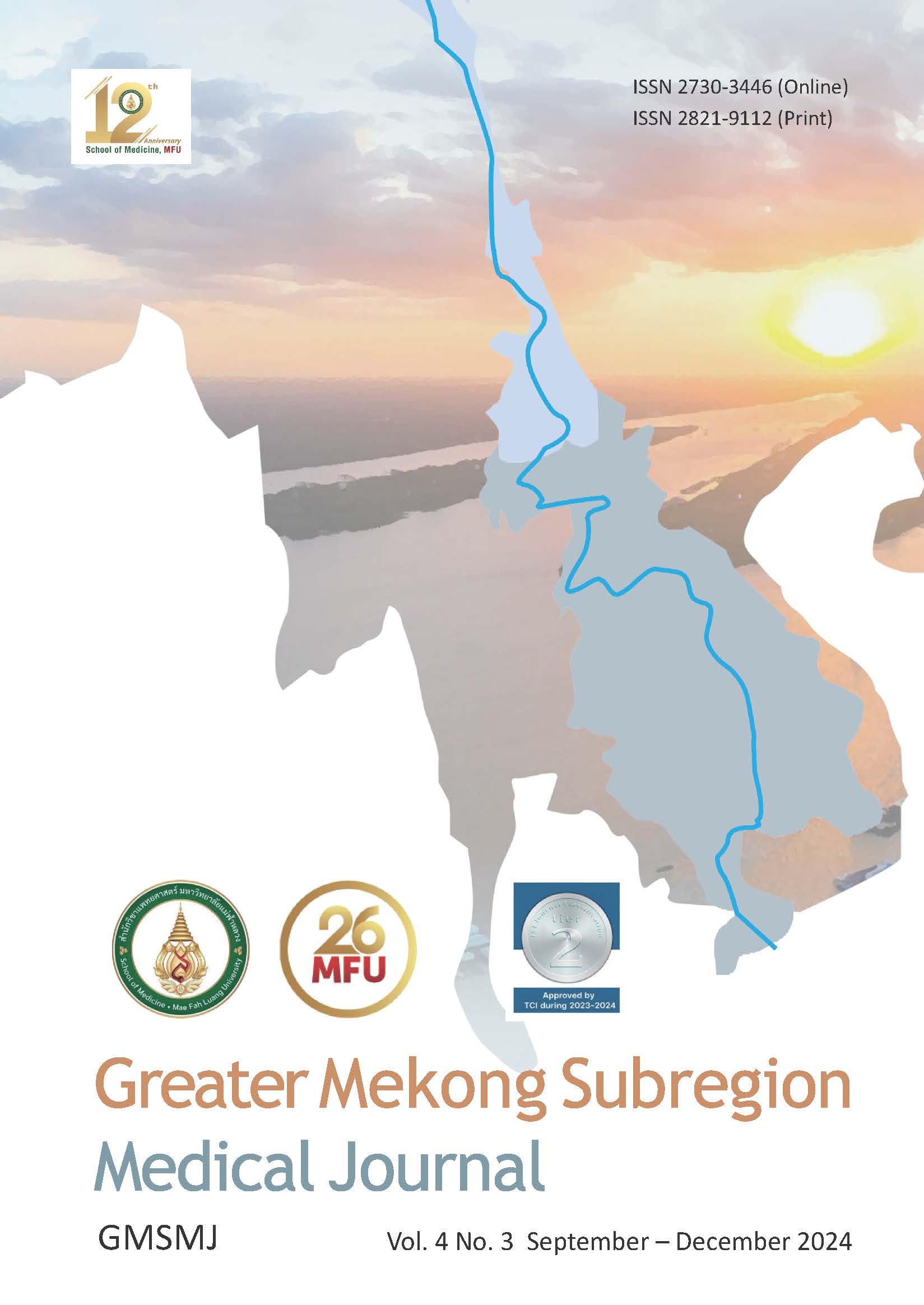Association between Psychological Conditions and Obesity in Elderly
Keywords:
Obesity, Elderly, DepressionAbstract
Background: Obesity has been related to psychological disorders such as depression and has been shown to be a key contributor to morbidity and to adversely affect working ability and quality of life.
Objective: The purpose of this study was to explore the association between body mass index (BMI) and depression amongst elderly people.
Materials and Method: This was a cross-sectional analytic study. Participants were living in Suphan Buri Province, Thailand. Data, including demographic information, body composition record, The Thai geriatric depression scale: TGDS-15 assessment was used to measure levels of depression from 34 elderly people. Obesity and normal weight were defined as body mass index ≥ 25 and 18.5-22.9 kg/m2, respectively.
Results: The association between depression and obesity were explored, controlling for age and BMI. After adjustments, a higher level of depression was found in obese elderly (compared with normal weight elderly) but not statistically significant between group. However, no significant association between depression and BMI. The positive associations between depression with BMI, weight, and the percentage of body fat, after controlling for potential confounders.
Conclusion: The present study found a positive association between depression in this obese elderly group. Future research should continue to explore the complex nature of obesity and develop more appropriate assessments and interventions to confirm these findings.
References
Lincoln KD. Race, Obesity, and Mental Health among Older Adults in the United States: A Literature Review. Innov Aging. 2020; 4 (5): 1-10, https://doi.org/10.1093/geroni/igaa031.
Cuijpers P, Auerbach RP, Benjet C, Bruffaerts R, Ebert D, Karyotaki E, et al. The World Health Organization World Mental Health International College Student initiative: An overview. Int J Methods Psychiatr Res. 2019; 28 (2): e1761, https://doi.org/10.1002/mpr.1761.
Sattler KM, Deane FP, Tapsell L, Kelly PJ. Gender differences in the relationship of weight-based stigmatisation with motivation to exercise and physical activity in overweight individuals. Health Psychol Open. 2018; 5 (1): 1-11, 2055102918759691, https://doi.org/10.1177/2055102918759691.
Huang JH, Li RH, Tsai LC. Relationship between Depression with Physical Activity and Obesity in Older Diabetes Patients: Inflammation as a Mediator. Nutrients. 2022; 14 (19): 4200, https://doi.org/10.3390/nu14194200.
Eik-Nes TT, Tokatlian A, Raman J, Spirou D, Kvaløy K. Depression, anxiety, and psychosocial stressors across BMI classes: A Norwegian population study - The HUNT Study. Front Endocrinol (Lausanne). 2022; 13: 886148, https://doi.org/10.3389/fendo.2022.886148.
Fulton S, Décarie-Spain L, Fioramonti X, Guiard B, Nakajima S. The menace of obesity to depression and anxiety prevalence. Trends Endocrinol Metab. 2022; 33 (1): 18-35, https://doi.org/10.1016/j.tem.2021.10.005.
Milaneschi Y, Simmons WK, van Rossum EFC, Penninx BW. Depression and obesity: evidence of shared biological mechanisms. Mol Psychiatry. 2019; 24 (1): 18-33, https://doi.org/10.1038/s41380-018-0017-5.
Institute of Health Metrics and Evaluation, Global Health Data Exchange (GHDx), 2022.
Andreas S, Schulz H, Volkert J, Dehoust M, Sehner S, Suling A, et al. Prevalence of mental disorders in elderly people: The European MentDis_ICF65+ study. The British Journal of Psychiatry. 2017; 210 (2): 125–31. https://doi.org/10.1192/bjp.bp.115.180463
Abbasi F, Kashfi SM, Nikbakht H-A, Karimi M. Common psychological disorders in elderly and their correlations with social support, Shiraz, Iran, 2018. Front Nurs. 2022; 1:115–22, https://doi.org/10.2478/fon-2022-0014
Telles-Correia D, Saraiva S, Gonçalves J. Mental Disorder-The Need for an Accurate Definition. Front Psychiatry. 2018; 9: 64, https://doi.org/10.3389/fpsyt.2018.00064.
Lu L, Shen H, Tan L, Huang Q, Chen Q, Liang M, et al. Prevalence and factors associated with anxiety and depression among community-dwelling older adults in Hunan, China: a cross-sectional study. BMC Psychiatry. 2023; 23: 107, https://doi.org/10.1186/s12888-023-04583-5
Luppino FS, de Wit LM, Bouvy PF, Stijnen T, Cuijpers P, Penninx BW, et al. Overweight, obesity, and depression: a systematic review and meta-analysis of longitudinal studies. Arch Gen Psychiatry. 2010; 67 (3): 220-9, https://doi.org/10.1001/archgenpsychiatry. 2010.2.
Lestari SK, Ng N, Kowal P, Santosa A. Diversity in the Factors Associated with ADL- Related Disability among Older People in Six Middle-Income Countries: A Cross-Country Comparison. Int J Environ Res Public Health. 2019; 16 (8): 1341, https://doi.org/10.3390/ijerph16081341.
Amiri S, Behnezhad S. Obesity and anxiety symptoms: a systematic review and meta- analysis. Neuropsychiatr. 2019; 33 (2): 72-89, https://doi.org/10.1007/s40211-019-0302-9.
Walker-Clarke A, Walasek L, Meyer C. Psychosocial factors influencing the eating behaviours of older adults: A systematic review. Ageing Res Rev. 2022; 77: 101597, https://doi.org/10.1016/j.arr.2022.101597.
Spielberger CD, Gorsuch RL. Manual for the State-trait anxiety inventory (form Y) (“self- evaluation questionnaire”) / Charles D. Spielberger in collaboration with Gorsuch RI, Lushene R, Vagg PR, and Jacobs GA. R.L. Consulting Psychologists Press, 1983.
Skapinakis P. Spielberger State-Trait Anxiety Inventory. In: Michalos AC (eds) Encyclopedia of Quality of Life and Well-Being Research. Springer, Dordrecht, 2014. https://doi.org/10.1007/978-94-007-0753-5_2825
Yesavage JA, Brink TL, Rose TL, Lum O, Huang V, Adey M, et al. Development and validation of a geriatric depression screening scale: a preliminary report. J Psychiatr Res. 1982-1983; 17 (1): 37-49, https://doi.org/10.1016/0022-3956 (82)90033-4.
Wongpakaran N, Wongpakaran T. Prevalence of major depressive disorders and suicide in long-term care facilities: a report from northern Thailand. Psychogeriatrics. 2012; 12(1): 11-7, https://doi.org/10.1111/j.1479-8301.2011.00383.x.
Sheikh JI, Yesavage JA. Geriatric Depression Scale (GDS): Recent evidence and development of a shorter version. Clinical Gerontologist: The Journal of Aging and Mental Health. 1986; 5 (1-2): 165–73. https://doi.org/10.1300/J018v05n01_09
Estrella-Castillo DF, Gómez-de-Regil L. Comparison of body mass index range criteria and their association with cognition, functioning and depression: a cross-sectional study in Mexican older adults. BMC Geriatr. 2019; 19: 339, https://doi.org/10.1186/s12877-019-1363-0
Amiri S, Behnezhad S. Obesity and anxiety symptoms: a systematic review and meta- analysis. Neuropsychiatr. 2019; 33 (2): 72-89, https://doi.org/10.1007/s40211-019-0302-9.
Boykin C, Seidel S, Webre G. Obesity and sedentary lifestyle as predictors of anxiety and depression. St. David’s School of Nursing, Texas State University, 2019.
Downloads
Published
How to Cite
Issue
Section
License
Copyright (c) 2024 Greater Mekong Subregion Medical Journal

This work is licensed under a Creative Commons Attribution-NonCommercial-NoDerivatives 4.0 International License.






